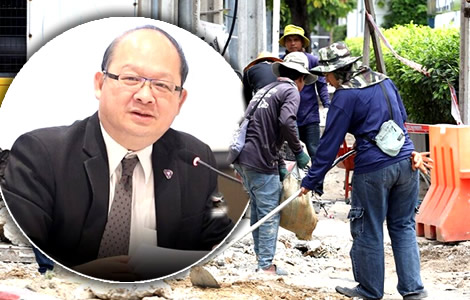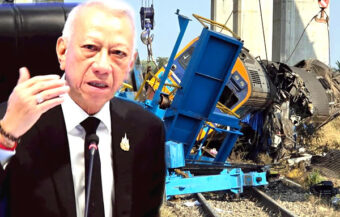Top Thai business leaders warn Cambodia stands to lose most in border dispute as over 1 million migrant workers stay put in Thailand. Tourism collapse hits casinos hard while the economic strain gains torque with little chance of workers returning home soon.
Top Thai business leaders on Saturday warned that the ongoing Thai-Cambodian border dispute is likely to escalate. While cross-border trade continues, it is becoming increasingly restricted and disrupted. Kriengkrai Thiennukul, Chairman of the Federation of Thai Industries (FTI), believes Cambodia stands to lose the most — particularly due to the absence of high-spending Thai tourists who regularly visit casinos along the eastern border. He also noted that there is little chance of Cambodian workers returning home at this time. Thailand currently hosts over one million Cambodian workers, including both legally documented labourers and undocumented migrants. Many live in Thailand with their families and earn significantly more than they could at home.

Cambodia’s recent request for its workers in Thailand to return home may cause more harm than good, according to leading Thai industrial voices. The Federation of Thai Industries (FTI) warns that the move could bring economic and social difficulties for Cambodia, not just Thailand.
Mr. Kriangkrai Thienukul, Chairman of the FTI, expressed concern over the deepening tension along the Thai-Cambodian border. He clarified that Thailand’s earlier decision to close parts of the border hasn’t directly affected overall economic or trade activity. However, it has disrupted the transportation of goods.
Shipments between the two nations are now slower due to stricter inspection procedures. In addition, reduced border crossing hours are making it harder for trucks to complete deliveries. Consequently, goods are stuck at checkpoints, leading to backlogs and missed sales.
Ongoing border closures cause delays in goods movement but trade and economic impact remain limited so far
“This situation may not be serious now,” Mr. Kriangkrai said. “But if it continues long-term, it will damage both countries’ interests.”
Cambodia’s economic losses are becoming visible in other areas too. With tourism suspended between the two nations, Thai tourists can no longer visit. The biggest impact is on Cambodian casinos, which relied heavily on Thai gamblers.
“These tourists are wealthy, and many go to gamble,” Mr. Kriangkrai noted. “Now, that revenue is gone.”
This abrupt halt in tourism has hurt Cambodia’s income flow, especially in cities built around gambling and entertainment. Without Thai tourists, hotels, restaurants, and casinos are facing significant financial strain.
On the issue of boycotting Thai products, Mr. Kriangkrai remained cautious. While some Cambodian nationalist groups have called for such action, most Cambodian citizens continue to buy Thai goods.
Tourism ban leaves Cambodian casinos struggling while consumer goods boycott efforts remain marginal
“From our survey of business owners in Cambodia, the situation remains stable,” he said. “Only a small group is pushing for a boycott.”
Still, he warned that continued transport disruptions could worsen the situation. Border timing changes have already reduced the volume of goods entering Cambodia.
If Thai exports continue to decline, Mr. Kriangkrai fears Cambodia might eventually reduce its imports. But that, he said, would hurt Cambodian consumers more than Thai businesses.
“Cambodians rely on Thai goods,” he explained. “If they stop buying them, their own people will suffer.”
The FTI is also watching developments related to Cambodian workers in Thailand. Cambodia has announced plans to bring its workers home, raising alarms in both countries.
Data from Thailand’s Ministry of Labor indicates there are around 430,000 legally registered Cambodian workers in the country. However, unofficial estimates suggest that total numbers may be two to three times higher — possibly exceeding one million.
Disruption to labour flow poses threat as over a million Cambodian workers may face a jobless return home crisis
Many of these workers are employed in labour-intensive sectors. They work in agriculture, construction, tourism and services — industries often avoided by Thai nationals.
Mr. Kriangkrai stressed that the return of these workers could trigger fresh problems for Cambodia. He explained that Cambodia’s domestic economy is weak and unlikely to offer enough jobs for returnees.
“Most workers came to Thailand to support their families,” he said. “Their incomes are vital back home.”
According to him, many undocumented workers — and even some in legal employment — are not eager to return. Without sufficient income or job options in Cambodia, they fear economic hardship.
“If they go back, how will they survive?” he asked. “There are no jobs and low wages. It will cause social stress.”
This labour migration also supports many Cambodian households. Workers in Thailand send money home regularly, providing lifelines for rural communities.
Economic pressure may worsen if returning workers cannot find jobs or replace remittance flows to Cambodia
Because of this, Mr. Kriangkrai believes the situation is unlikely to escalate. He added that both governments should avoid further conflict and maintain cross-border cooperation.
“As a private sector voice, we hope security officials on both sides can calm the tension,” he said. “We want to see relations return to normal soon.”
Further insight came from Mr. Kritsada Chanjamrassaeng, Vice President of the Thai Contractors Association under Royal Patronage. He reported that the construction sector has not yet seen Cambodian workers leaving in large numbers.
Most workers returning to Cambodia, he said, are those living near the border. They travel back and forth daily and are not full-time migrants.
“For construction, we haven’t seen much movement,” Mr. Kritsada said. “Legal workers are staying put.”
Cambodian construction workers mostly remain as border commuters return but core workforce stays put
He believes workers with legal permits will not leave unless the situation worsens. In fact, many are motivated to remain because of higher Thai wages.
“Thai wages are three times higher than in Cambodia,” he pointed out. “They have strong reasons to stay.”
At present, about 200,000 Cambodian workers are involved in Thai construction. Some are legal, while others are undocumented.
Wages vary by skill and region. The average wage for female labourers is around ฿360 per day. Male workers typically earn ฿400 or more. Skilled labourers such as welders, painters and electricians can earn up to ฿600 daily.
With these wages, workers can support families and save money — something not possible in Cambodia’s struggling economy.
Mr. Kritsada believes that unless tensions escalate into a larger conflict, most Cambodian workers will choose to remain in Thailand.
“They won’t go back unless they’re forced,” he said. “They simply can’t earn the same at home.”
With higher Thai wages and few home prospects most workers unlikely to return unless crisis deepens severely
Both Mr. Kriangkrai and Mr. Kritsada emphasised the need for calm and constructive dialogue between the two nations. Economic interdependence runs deep, especially in labour, trade and tourism.
They warn that prolonged tensions or drastic actions — like mass deportations or trade boycotts — would damage both economies.
Cambodia files a complaint against Thailand with the International Court of Justice (ICJ). What comes next?
Cambodia outflanks Thailand again even as talks took place in Phnom Penh. Insists on ICJ court ruling
Rome wants electricity and internet cut off to areas of Cambodia along Thailand’s border to show strength
Therefore, Thai business leaders are urging both governments to find a diplomatic solution quickly. Restoring normalcy, they said, will benefit both sides and prevent long-term fallout.
In the meantime, businesses continue to monitor the situation carefully. Many are adjusting logistics and labour strategies to prepare for any changes.
Still, the hope remains that diplomacy will prevail. Only by working together, both sides agree, can Thailand and Cambodia avoid deeper economic pain.


















